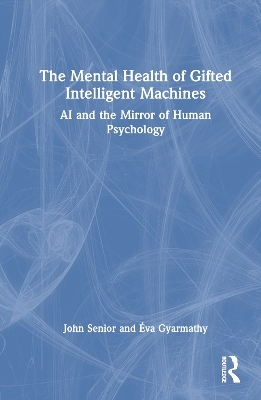
The Mental Health of Gifted Intelligent Machines
Routledge (Verlag)
978-1-032-25668-9 (ISBN)
The Mental Health of Gifted Intelligent Machines explores the increasingly sophisticated behaviours of developing AI and how we can ensure it will have emotional resilience, ethical strength and an ability to think in a new and enhanced way. Its primary aim is to change how we understand the world by investigating humanity as an intelligent being, examining and contrasting human and artificial intelligence.
The book considers what we can learn from the likely mental health issues that will occur with increasingly sophisticated aspects of machine intelligence and how they will reflect the human condition. It asks questions about our identity in a deeply uncertain and disruptive ever-changing world; how we will improve and enhance our psychological intelligence to meet the increasing complications and demands of the future; and what we need to do, now, to be psychologically intelligent enough to live a full meaningful life in a new world evolving around us. The book argues that changes in our understanding of mental health, psychology and our view of intelligence will challenge huge aspects of our fundamental beliefs and assumptions and that it is essential we explore new arenas to further understand both our own human psychological issues and mental health as we develop gifted intelligent machines.
It is a must read for all students, researchers and professionals involved with AI, gifted education, consciousness and mental health.
John Senior is a writer and a visiting senior researcher at the Institute for Cognitive Neuroscience and Psychology of the Hungarian Academy. He lectures on atypical learners and gifted creatives. Publications include AI and Developing Human Intelligence (Senior & Gyarmathy, 2022), Effective Learning and Wellbeing (Philo and Senior 2023) and enrichment activities that stimulate independent thinking. His research concerns the impact of mental health issues affecting human intelligence (HI), well-being and potential psychodynamic mental health issues of gifted artificial intelligent machines (GAIM). Éva Gyarmathy is a professor at the Apor Vilmos Catholic College and a senior researcher at the Institute of Cognitive Neuroscience and Psychology. Her research interest focuses on the challenges of the 21st century, like AI, and with it on talent associated with specific learning difficulties, ADHD and/or autism spectra and other neurodiversity. She is a lecturer at several universities. She is also a consultant to schools that serve children and adolescents who could not be integrated into mainstream schools. She founded the Atypical Development Methodology Centre, the Adolescent and Adult Dyslexia Centre and the Special Need Talent Support Council.
Part I. Darkside when All is Otherwise 1. Mental health in the mirror of AI 2. Psychopaths the survival experts 3. Humour – a unique survival tool Part II: Mental abilities in the mirror of AI 4. The twice exceptional (2e) gifted learner: embracing neurodiversity and AI, the hidden potential 5. Spiritually and sexuality: the possible futures of robot-human sexual – spiritual relationships 6. The reasonable machine and we Part III. Identity 7. The development of the identity of human beings and machines 8. The future of identity: people, machines, and curious cognition Part IIII. A post-who-knows-what 9. A poetical scientific proposal 10. Patterns of future change 11. Conjoining intelligences: human-AI integration 12. The psychology of machines: exploring human-machine interaction 13. Preparing for the post-future 14. When history ends in a moment
| Erscheinungsdatum | 15.02.2024 |
|---|---|
| Zusatzinfo | 18 Tables, black and white; 6 Line drawings, black and white; 6 Illustrations, black and white |
| Verlagsort | London |
| Sprache | englisch |
| Maße | 156 x 234 mm |
| Gewicht | 721 g |
| Themenwelt | Geisteswissenschaften ► Psychologie ► Allgemeine Psychologie |
| Geisteswissenschaften ► Psychologie ► Sozialpsychologie | |
| Geisteswissenschaften ► Psychologie ► Verhaltenstherapie | |
| ISBN-10 | 1-032-25668-0 / 1032256680 |
| ISBN-13 | 978-1-032-25668-9 / 9781032256689 |
| Zustand | Neuware |
| Informationen gemäß Produktsicherheitsverordnung (GPSR) | |
| Haben Sie eine Frage zum Produkt? |
aus dem Bereich


